The Need for Employee Motivation in Business: A Research Proposal
VerifiedAdded on 2023/01/05
|8
|2028
|59
Report
AI Summary
This research proposal investigates the critical role of employee motivation in enhancing business operations and productivity, using Unilever Plc as a case study. The proposal outlines the background, rationale, research questions, aims, and objectives, emphasizing the significance of employee motivation for business success. It explores the concept of employee motivation, its impact on performance, and suitable motivational strategies. The methodology section details the research philosophy (positivism), approach (deductive), design (descriptive), and strategy (quantitative), including data collection methods (surveys, questionnaires), sampling techniques (random sampling), and ethical considerations. The study aims to identify the need for employee motivation, analyze its effects on performance, and determine effective strategies for Unilever Plc. The proposal provides an in-depth analysis of the topic, supported by relevant references, to provide a comprehensive understanding of employee motivation and its impact on business outcomes. The research will gather data through surveys and questionnaires, focusing on a sample of 40 employees from Unilever Plc, ensuring ethical considerations throughout the process.
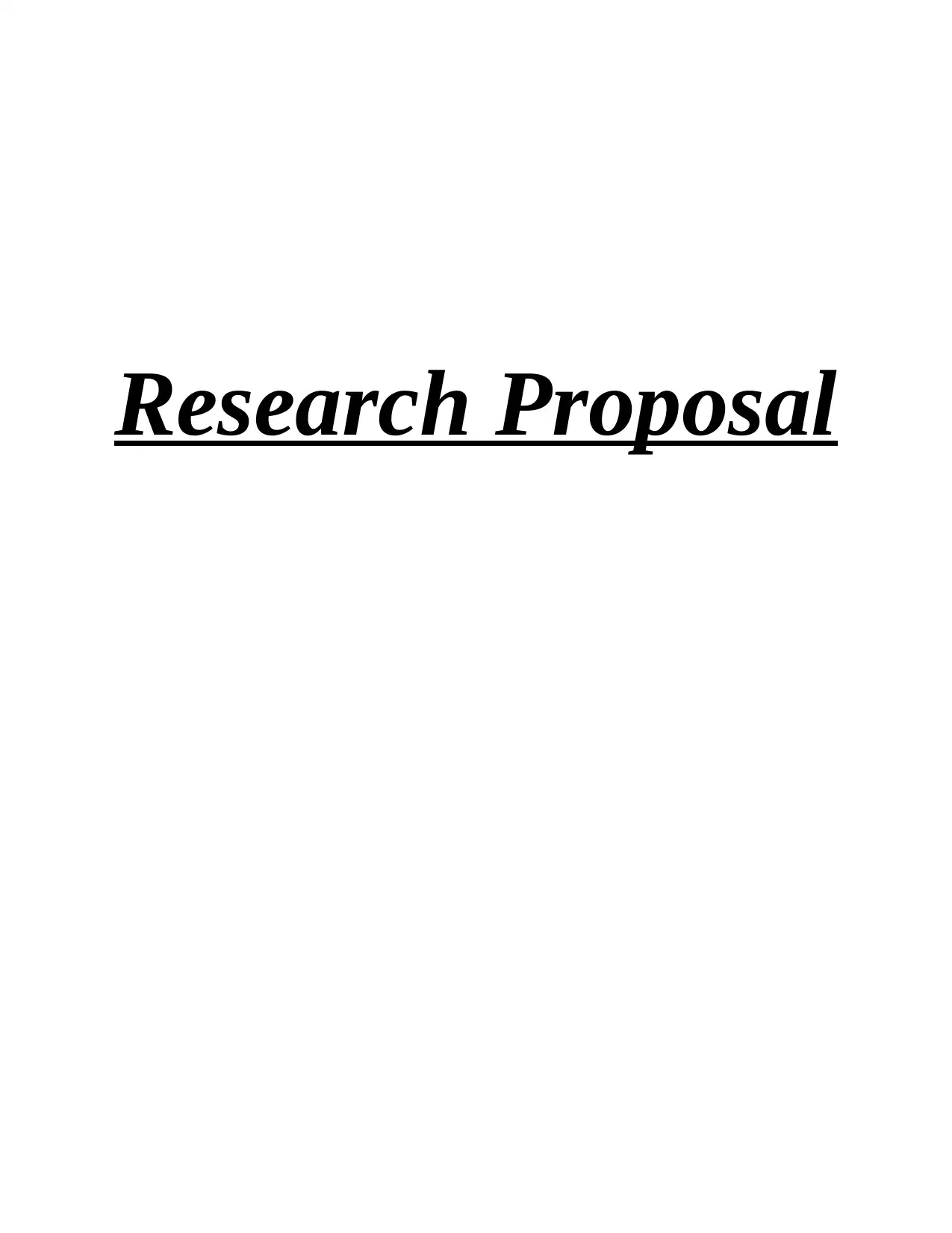
Research Proposal
Paraphrase This Document
Need a fresh take? Get an instant paraphrase of this document with our AI Paraphraser
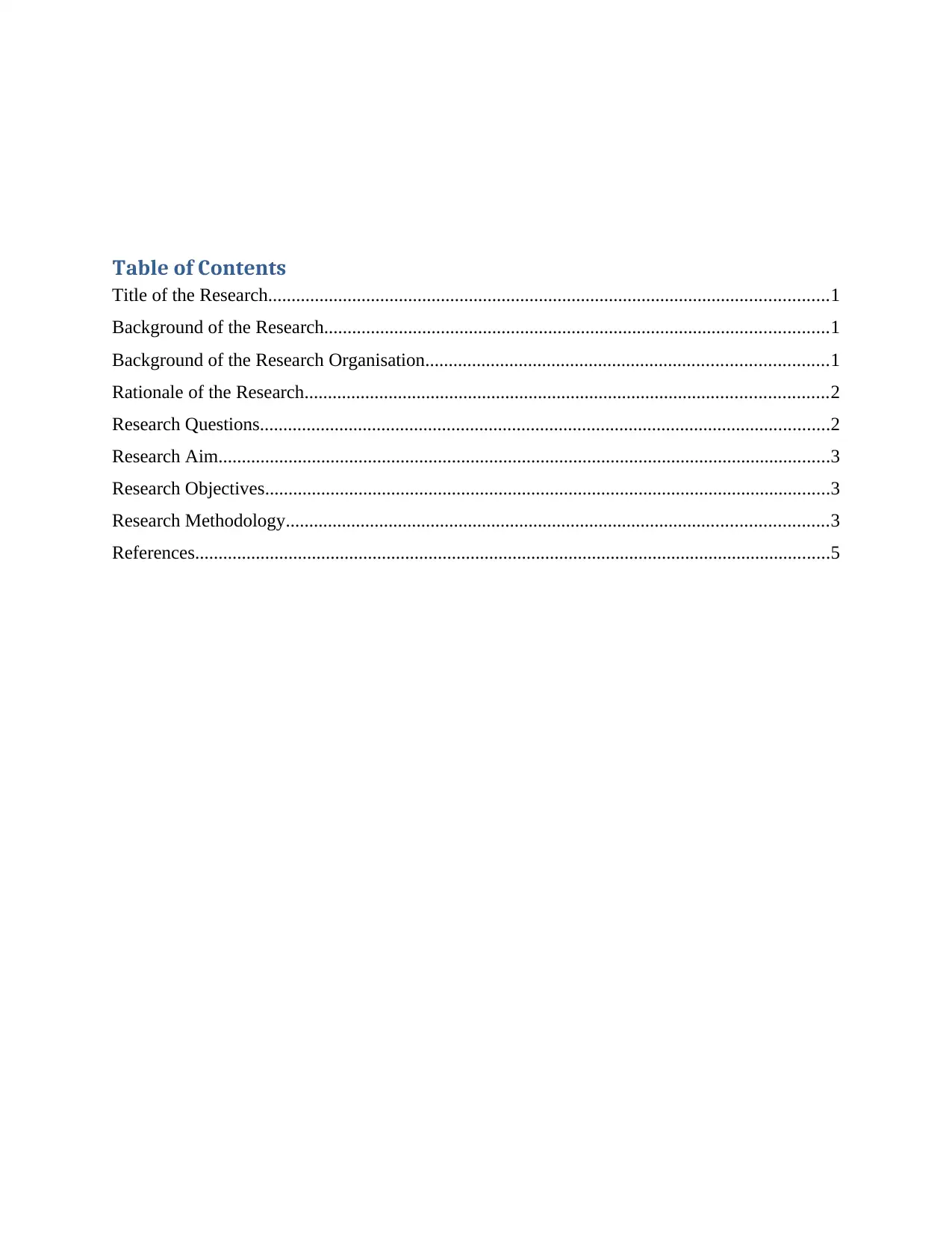
Table of Contents
Title of the Research........................................................................................................................1
Background of the Research............................................................................................................1
Background of the Research Organisation......................................................................................1
Rationale of the Research................................................................................................................2
Research Questions..........................................................................................................................2
Research Aim...................................................................................................................................3
Research Objectives.........................................................................................................................3
Research Methodology....................................................................................................................3
References........................................................................................................................................5
Title of the Research........................................................................................................................1
Background of the Research............................................................................................................1
Background of the Research Organisation......................................................................................1
Rationale of the Research................................................................................................................2
Research Questions..........................................................................................................................2
Research Aim...................................................................................................................................3
Research Objectives.........................................................................................................................3
Research Methodology....................................................................................................................3
References........................................................................................................................................5

⊘ This is a preview!⊘
Do you want full access?
Subscribe today to unlock all pages.

Trusted by 1+ million students worldwide
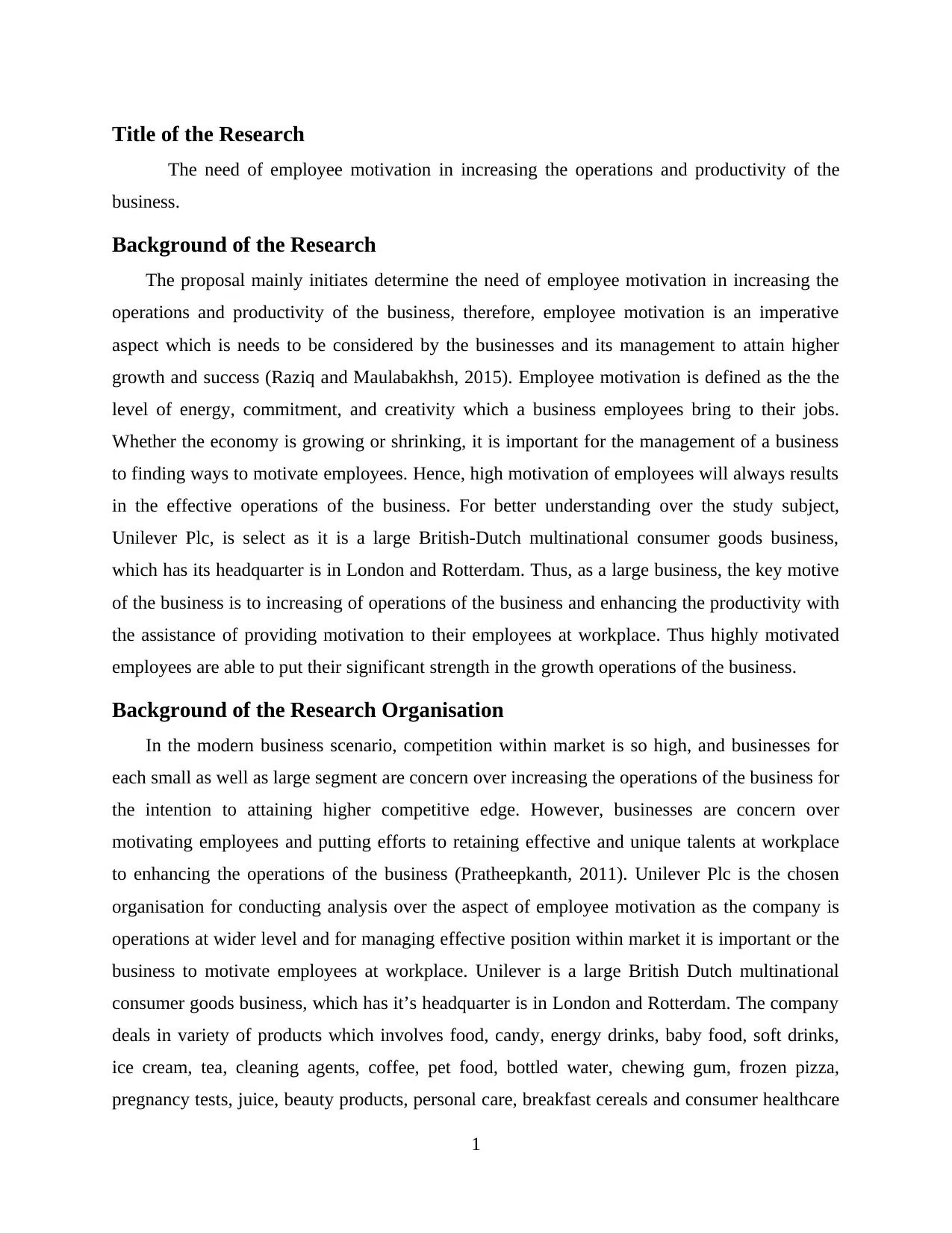
Title of the Research
The need of employee motivation in increasing the operations and productivity of the
business.
Background of the Research
The proposal mainly initiates determine the need of employee motivation in increasing the
operations and productivity of the business, therefore, employee motivation is an imperative
aspect which is needs to be considered by the businesses and its management to attain higher
growth and success (Raziq and Maulabakhsh, 2015). Employee motivation is defined as the the
level of energy, commitment, and creativity which a business employees bring to their jobs.
Whether the economy is growing or shrinking, it is important for the management of a business
to finding ways to motivate employees. Hence, high motivation of employees will always results
in the effective operations of the business. For better understanding over the study subject,
Unilever Plc, is select as it is a large British-Dutch multinational consumer goods business,
which has its headquarter is in London and Rotterdam. Thus, as a large business, the key motive
of the business is to increasing of operations of the business and enhancing the productivity with
the assistance of providing motivation to their employees at workplace. Thus highly motivated
employees are able to put their significant strength in the growth operations of the business.
Background of the Research Organisation
In the modern business scenario, competition within market is so high, and businesses for
each small as well as large segment are concern over increasing the operations of the business for
the intention to attaining higher competitive edge. However, businesses are concern over
motivating employees and putting efforts to retaining effective and unique talents at workplace
to enhancing the operations of the business (Pratheepkanth, 2011). Unilever Plc is the chosen
organisation for conducting analysis over the aspect of employee motivation as the company is
operations at wider level and for managing effective position within market it is important or the
business to motivate employees at workplace. Unilever is a large British Dutch multinational
consumer goods business, which has it’s headquarter is in London and Rotterdam. The company
deals in variety of products which involves food, candy, energy drinks, baby food, soft drinks,
ice cream, tea, cleaning agents, coffee, pet food, bottled water, chewing gum, frozen pizza,
pregnancy tests, juice, beauty products, personal care, breakfast cereals and consumer healthcare
1
The need of employee motivation in increasing the operations and productivity of the
business.
Background of the Research
The proposal mainly initiates determine the need of employee motivation in increasing the
operations and productivity of the business, therefore, employee motivation is an imperative
aspect which is needs to be considered by the businesses and its management to attain higher
growth and success (Raziq and Maulabakhsh, 2015). Employee motivation is defined as the the
level of energy, commitment, and creativity which a business employees bring to their jobs.
Whether the economy is growing or shrinking, it is important for the management of a business
to finding ways to motivate employees. Hence, high motivation of employees will always results
in the effective operations of the business. For better understanding over the study subject,
Unilever Plc, is select as it is a large British-Dutch multinational consumer goods business,
which has its headquarter is in London and Rotterdam. Thus, as a large business, the key motive
of the business is to increasing of operations of the business and enhancing the productivity with
the assistance of providing motivation to their employees at workplace. Thus highly motivated
employees are able to put their significant strength in the growth operations of the business.
Background of the Research Organisation
In the modern business scenario, competition within market is so high, and businesses for
each small as well as large segment are concern over increasing the operations of the business for
the intention to attaining higher competitive edge. However, businesses are concern over
motivating employees and putting efforts to retaining effective and unique talents at workplace
to enhancing the operations of the business (Pratheepkanth, 2011). Unilever Plc is the chosen
organisation for conducting analysis over the aspect of employee motivation as the company is
operations at wider level and for managing effective position within market it is important or the
business to motivate employees at workplace. Unilever is a large British Dutch multinational
consumer goods business, which has it’s headquarter is in London and Rotterdam. The company
deals in variety of products which involves food, candy, energy drinks, baby food, soft drinks,
ice cream, tea, cleaning agents, coffee, pet food, bottled water, chewing gum, frozen pizza,
pregnancy tests, juice, beauty products, personal care, breakfast cereals and consumer healthcare
1
Paraphrase This Document
Need a fresh take? Get an instant paraphrase of this document with our AI Paraphraser
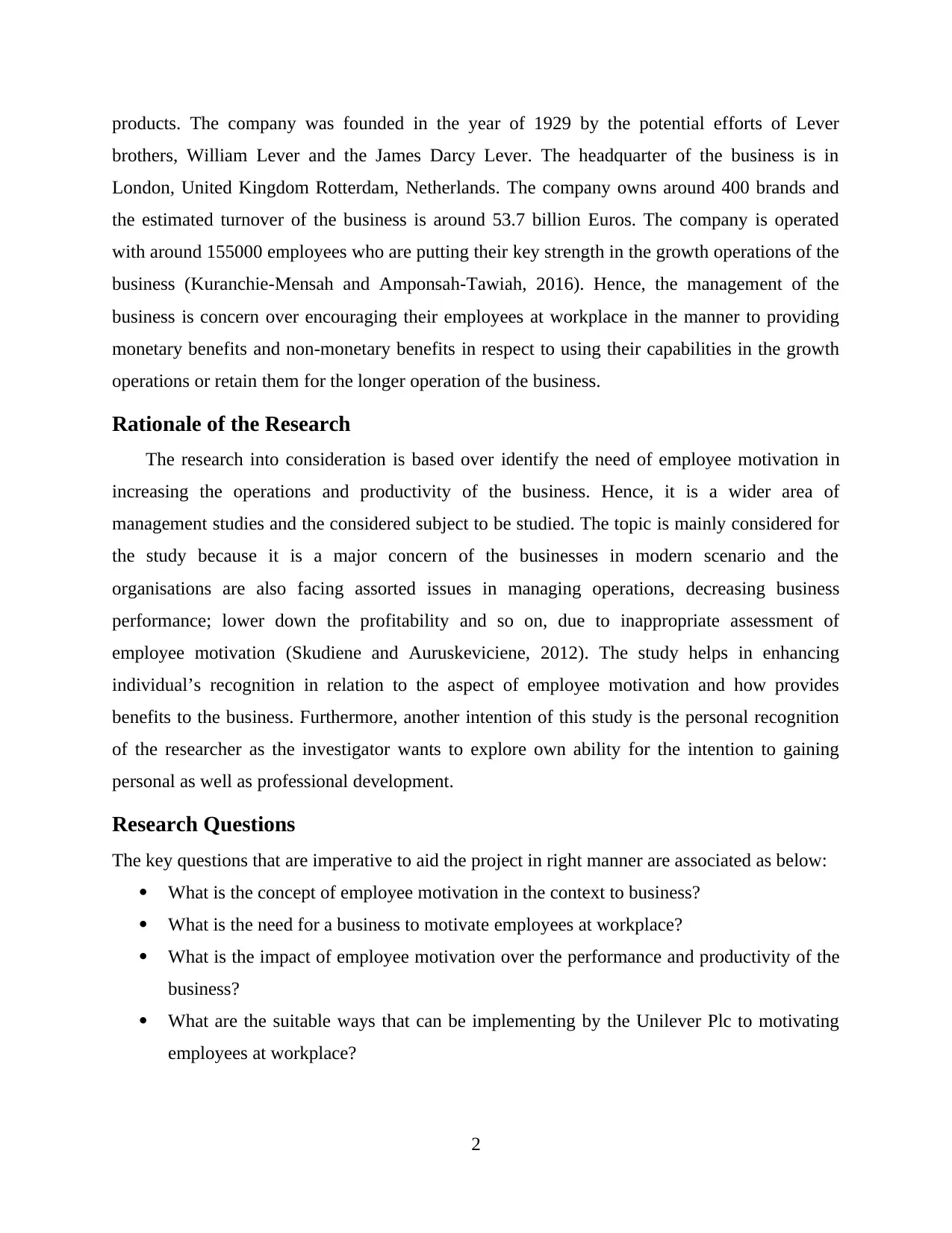
products. The company was founded in the year of 1929 by the potential efforts of Lever
brothers, William Lever and the James Darcy Lever. The headquarter of the business is in
London, United Kingdom Rotterdam, Netherlands. The company owns around 400 brands and
the estimated turnover of the business is around 53.7 billion Euros. The company is operated
with around 155000 employees who are putting their key strength in the growth operations of the
business (Kuranchie-Mensah and Amponsah-Tawiah, 2016). Hence, the management of the
business is concern over encouraging their employees at workplace in the manner to providing
monetary benefits and non-monetary benefits in respect to using their capabilities in the growth
operations or retain them for the longer operation of the business.
Rationale of the Research
The research into consideration is based over identify the need of employee motivation in
increasing the operations and productivity of the business. Hence, it is a wider area of
management studies and the considered subject to be studied. The topic is mainly considered for
the study because it is a major concern of the businesses in modern scenario and the
organisations are also facing assorted issues in managing operations, decreasing business
performance; lower down the profitability and so on, due to inappropriate assessment of
employee motivation (Skudiene and Auruskeviciene, 2012). The study helps in enhancing
individual’s recognition in relation to the aspect of employee motivation and how provides
benefits to the business. Furthermore, another intention of this study is the personal recognition
of the researcher as the investigator wants to explore own ability for the intention to gaining
personal as well as professional development.
Research Questions
The key questions that are imperative to aid the project in right manner are associated as below:
What is the concept of employee motivation in the context to business?
What is the need for a business to motivate employees at workplace?
What is the impact of employee motivation over the performance and productivity of the
business?
What are the suitable ways that can be implementing by the Unilever Plc to motivating
employees at workplace?
2
brothers, William Lever and the James Darcy Lever. The headquarter of the business is in
London, United Kingdom Rotterdam, Netherlands. The company owns around 400 brands and
the estimated turnover of the business is around 53.7 billion Euros. The company is operated
with around 155000 employees who are putting their key strength in the growth operations of the
business (Kuranchie-Mensah and Amponsah-Tawiah, 2016). Hence, the management of the
business is concern over encouraging their employees at workplace in the manner to providing
monetary benefits and non-monetary benefits in respect to using their capabilities in the growth
operations or retain them for the longer operation of the business.
Rationale of the Research
The research into consideration is based over identify the need of employee motivation in
increasing the operations and productivity of the business. Hence, it is a wider area of
management studies and the considered subject to be studied. The topic is mainly considered for
the study because it is a major concern of the businesses in modern scenario and the
organisations are also facing assorted issues in managing operations, decreasing business
performance; lower down the profitability and so on, due to inappropriate assessment of
employee motivation (Skudiene and Auruskeviciene, 2012). The study helps in enhancing
individual’s recognition in relation to the aspect of employee motivation and how provides
benefits to the business. Furthermore, another intention of this study is the personal recognition
of the researcher as the investigator wants to explore own ability for the intention to gaining
personal as well as professional development.
Research Questions
The key questions that are imperative to aid the project in right manner are associated as below:
What is the concept of employee motivation in the context to business?
What is the need for a business to motivate employees at workplace?
What is the impact of employee motivation over the performance and productivity of the
business?
What are the suitable ways that can be implementing by the Unilever Plc to motivating
employees at workplace?
2
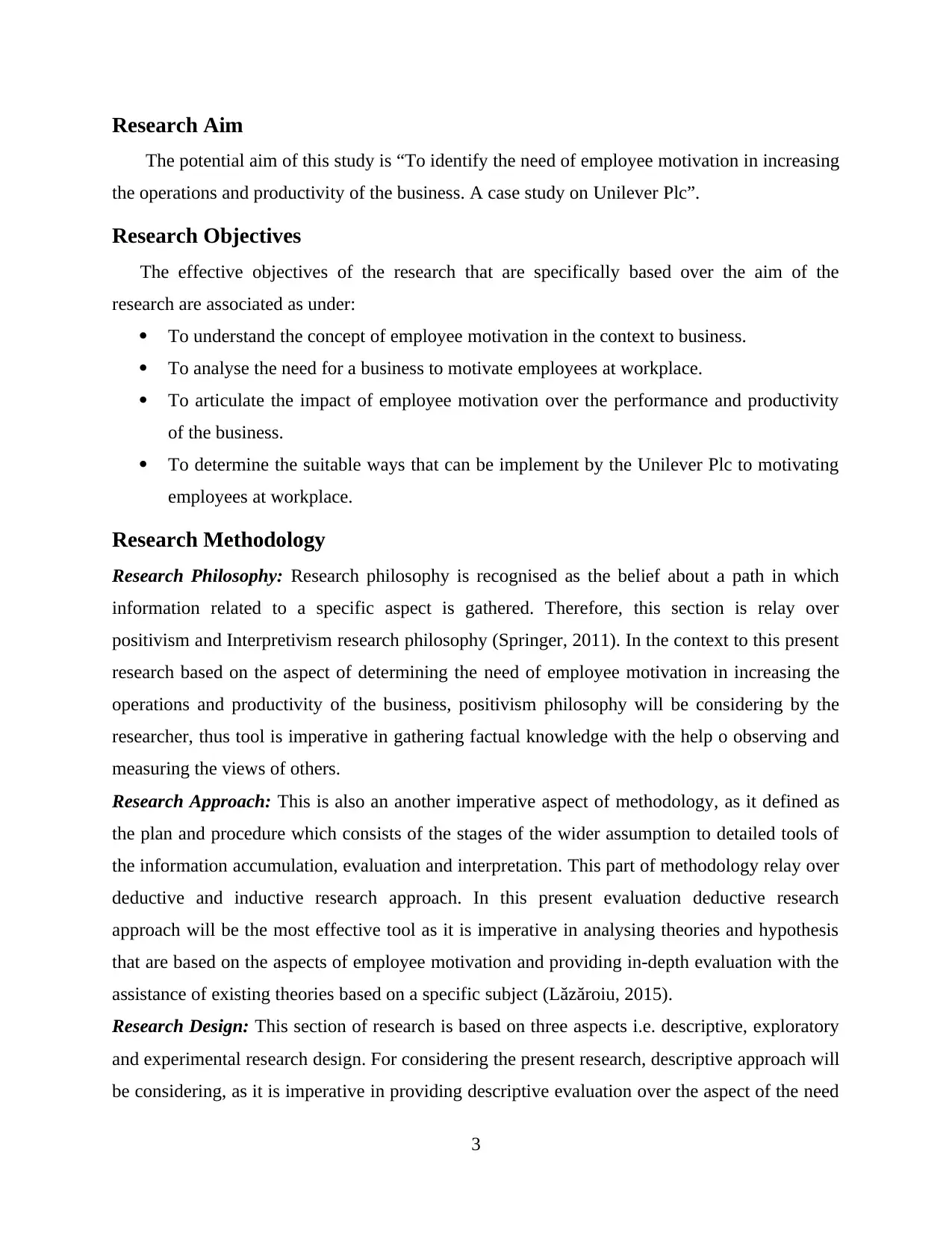
Research Aim
The potential aim of this study is “To identify the need of employee motivation in increasing
the operations and productivity of the business. A case study on Unilever Plc”.
Research Objectives
The effective objectives of the research that are specifically based over the aim of the
research are associated as under:
To understand the concept of employee motivation in the context to business.
To analyse the need for a business to motivate employees at workplace.
To articulate the impact of employee motivation over the performance and productivity
of the business.
To determine the suitable ways that can be implement by the Unilever Plc to motivating
employees at workplace.
Research Methodology
Research Philosophy: Research philosophy is recognised as the belief about a path in which
information related to a specific aspect is gathered. Therefore, this section is relay over
positivism and Interpretivism research philosophy (Springer, 2011). In the context to this present
research based on the aspect of determining the need of employee motivation in increasing the
operations and productivity of the business, positivism philosophy will be considering by the
researcher, thus tool is imperative in gathering factual knowledge with the help o observing and
measuring the views of others.
Research Approach: This is also an another imperative aspect of methodology, as it defined as
the plan and procedure which consists of the stages of the wider assumption to detailed tools of
the information accumulation, evaluation and interpretation. This part of methodology relay over
deductive and inductive research approach. In this present evaluation deductive research
approach will be the most effective tool as it is imperative in analysing theories and hypothesis
that are based on the aspects of employee motivation and providing in-depth evaluation with the
assistance of existing theories based on a specific subject (Lăzăroiu, 2015).
Research Design: This section of research is based on three aspects i.e. descriptive, exploratory
and experimental research design. For considering the present research, descriptive approach will
be considering, as it is imperative in providing descriptive evaluation over the aspect of the need
3
The potential aim of this study is “To identify the need of employee motivation in increasing
the operations and productivity of the business. A case study on Unilever Plc”.
Research Objectives
The effective objectives of the research that are specifically based over the aim of the
research are associated as under:
To understand the concept of employee motivation in the context to business.
To analyse the need for a business to motivate employees at workplace.
To articulate the impact of employee motivation over the performance and productivity
of the business.
To determine the suitable ways that can be implement by the Unilever Plc to motivating
employees at workplace.
Research Methodology
Research Philosophy: Research philosophy is recognised as the belief about a path in which
information related to a specific aspect is gathered. Therefore, this section is relay over
positivism and Interpretivism research philosophy (Springer, 2011). In the context to this present
research based on the aspect of determining the need of employee motivation in increasing the
operations and productivity of the business, positivism philosophy will be considering by the
researcher, thus tool is imperative in gathering factual knowledge with the help o observing and
measuring the views of others.
Research Approach: This is also an another imperative aspect of methodology, as it defined as
the plan and procedure which consists of the stages of the wider assumption to detailed tools of
the information accumulation, evaluation and interpretation. This part of methodology relay over
deductive and inductive research approach. In this present evaluation deductive research
approach will be the most effective tool as it is imperative in analysing theories and hypothesis
that are based on the aspects of employee motivation and providing in-depth evaluation with the
assistance of existing theories based on a specific subject (Lăzăroiu, 2015).
Research Design: This section of research is based on three aspects i.e. descriptive, exploratory
and experimental research design. For considering the present research, descriptive approach will
be considering, as it is imperative in providing descriptive evaluation over the aspect of the need
3
⊘ This is a preview!⊘
Do you want full access?
Subscribe today to unlock all pages.

Trusted by 1+ million students worldwide
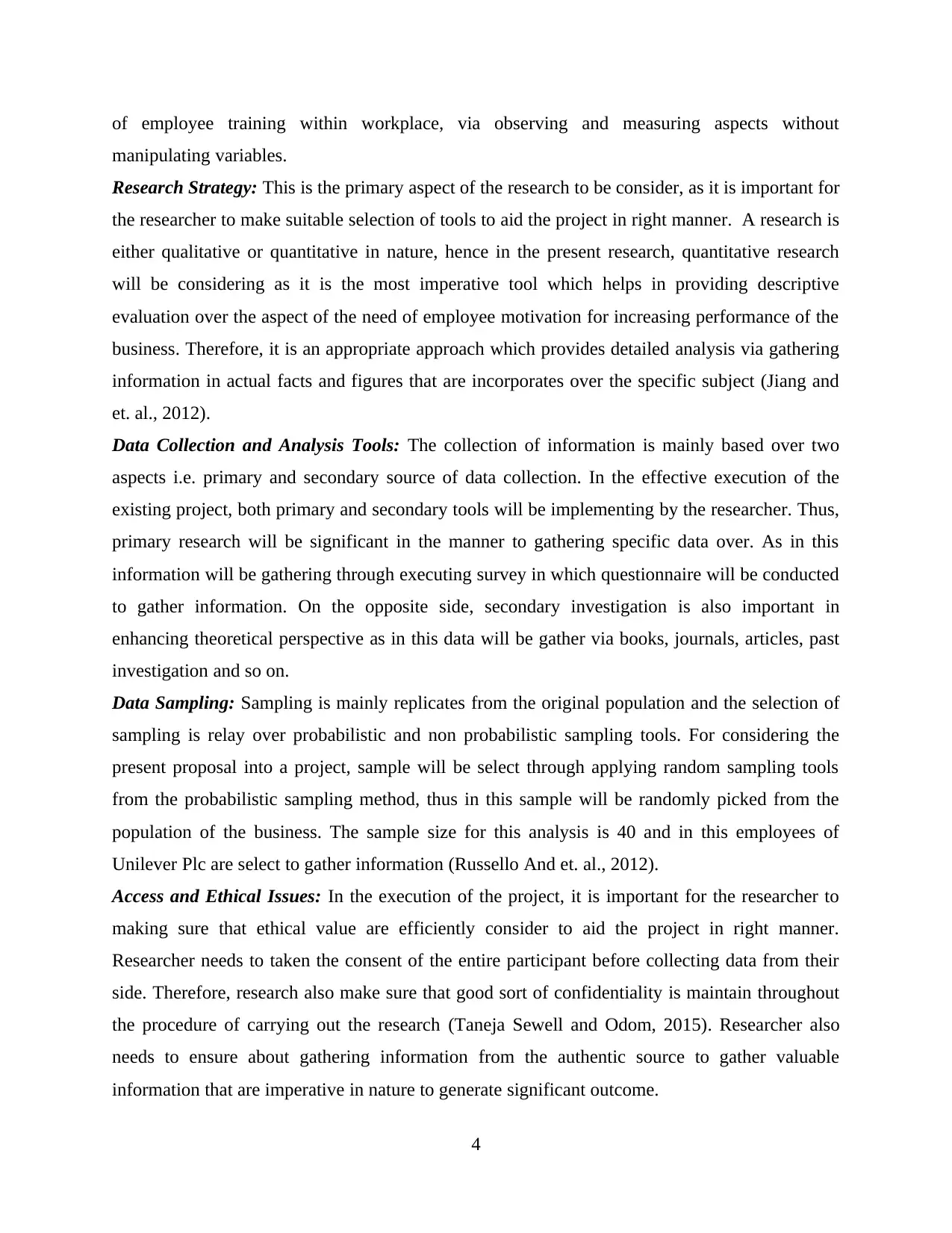
of employee training within workplace, via observing and measuring aspects without
manipulating variables.
Research Strategy: This is the primary aspect of the research to be consider, as it is important for
the researcher to make suitable selection of tools to aid the project in right manner. A research is
either qualitative or quantitative in nature, hence in the present research, quantitative research
will be considering as it is the most imperative tool which helps in providing descriptive
evaluation over the aspect of the need of employee motivation for increasing performance of the
business. Therefore, it is an appropriate approach which provides detailed analysis via gathering
information in actual facts and figures that are incorporates over the specific subject (Jiang and
et. al., 2012).
Data Collection and Analysis Tools: The collection of information is mainly based over two
aspects i.e. primary and secondary source of data collection. In the effective execution of the
existing project, both primary and secondary tools will be implementing by the researcher. Thus,
primary research will be significant in the manner to gathering specific data over. As in this
information will be gathering through executing survey in which questionnaire will be conducted
to gather information. On the opposite side, secondary investigation is also important in
enhancing theoretical perspective as in this data will be gather via books, journals, articles, past
investigation and so on.
Data Sampling: Sampling is mainly replicates from the original population and the selection of
sampling is relay over probabilistic and non probabilistic sampling tools. For considering the
present proposal into a project, sample will be select through applying random sampling tools
from the probabilistic sampling method, thus in this sample will be randomly picked from the
population of the business. The sample size for this analysis is 40 and in this employees of
Unilever Plc are select to gather information (Russello And et. al., 2012).
Access and Ethical Issues: In the execution of the project, it is important for the researcher to
making sure that ethical value are efficiently consider to aid the project in right manner.
Researcher needs to taken the consent of the entire participant before collecting data from their
side. Therefore, research also make sure that good sort of confidentiality is maintain throughout
the procedure of carrying out the research (Taneja Sewell and Odom, 2015). Researcher also
needs to ensure about gathering information from the authentic source to gather valuable
information that are imperative in nature to generate significant outcome.
4
manipulating variables.
Research Strategy: This is the primary aspect of the research to be consider, as it is important for
the researcher to make suitable selection of tools to aid the project in right manner. A research is
either qualitative or quantitative in nature, hence in the present research, quantitative research
will be considering as it is the most imperative tool which helps in providing descriptive
evaluation over the aspect of the need of employee motivation for increasing performance of the
business. Therefore, it is an appropriate approach which provides detailed analysis via gathering
information in actual facts and figures that are incorporates over the specific subject (Jiang and
et. al., 2012).
Data Collection and Analysis Tools: The collection of information is mainly based over two
aspects i.e. primary and secondary source of data collection. In the effective execution of the
existing project, both primary and secondary tools will be implementing by the researcher. Thus,
primary research will be significant in the manner to gathering specific data over. As in this
information will be gathering through executing survey in which questionnaire will be conducted
to gather information. On the opposite side, secondary investigation is also important in
enhancing theoretical perspective as in this data will be gather via books, journals, articles, past
investigation and so on.
Data Sampling: Sampling is mainly replicates from the original population and the selection of
sampling is relay over probabilistic and non probabilistic sampling tools. For considering the
present proposal into a project, sample will be select through applying random sampling tools
from the probabilistic sampling method, thus in this sample will be randomly picked from the
population of the business. The sample size for this analysis is 40 and in this employees of
Unilever Plc are select to gather information (Russello And et. al., 2012).
Access and Ethical Issues: In the execution of the project, it is important for the researcher to
making sure that ethical value are efficiently consider to aid the project in right manner.
Researcher needs to taken the consent of the entire participant before collecting data from their
side. Therefore, research also make sure that good sort of confidentiality is maintain throughout
the procedure of carrying out the research (Taneja Sewell and Odom, 2015). Researcher also
needs to ensure about gathering information from the authentic source to gather valuable
information that are imperative in nature to generate significant outcome.
4
Paraphrase This Document
Need a fresh take? Get an instant paraphrase of this document with our AI Paraphraser
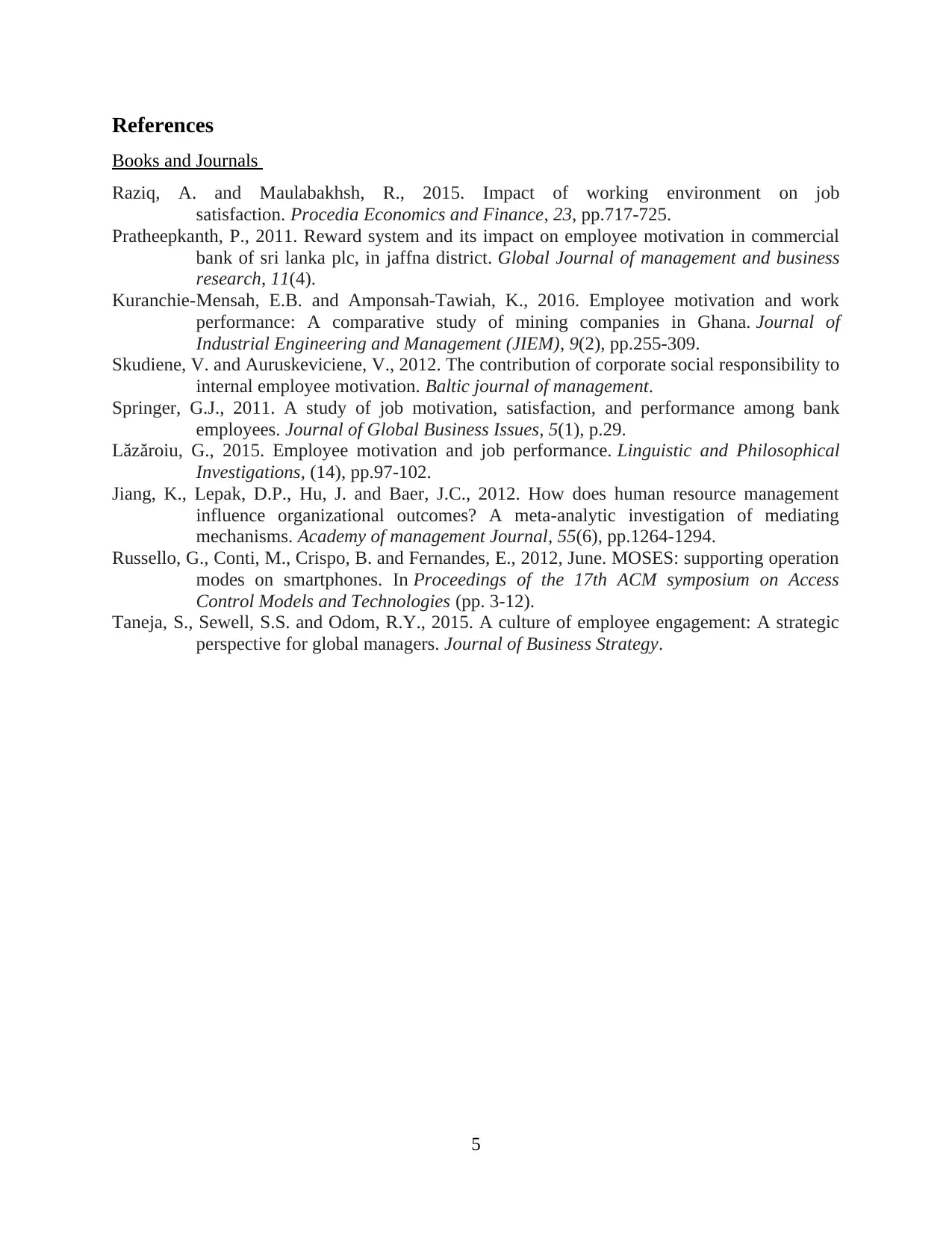
References
Books and Journals
Raziq, A. and Maulabakhsh, R., 2015. Impact of working environment on job
satisfaction. Procedia Economics and Finance, 23, pp.717-725.
Pratheepkanth, P., 2011. Reward system and its impact on employee motivation in commercial
bank of sri lanka plc, in jaffna district. Global Journal of management and business
research, 11(4).
Kuranchie-Mensah, E.B. and Amponsah-Tawiah, K., 2016. Employee motivation and work
performance: A comparative study of mining companies in Ghana. Journal of
Industrial Engineering and Management (JIEM), 9(2), pp.255-309.
Skudiene, V. and Auruskeviciene, V., 2012. The contribution of corporate social responsibility to
internal employee motivation. Baltic journal of management.
Springer, G.J., 2011. A study of job motivation, satisfaction, and performance among bank
employees. Journal of Global Business Issues, 5(1), p.29.
Lăzăroiu, G., 2015. Employee motivation and job performance. Linguistic and Philosophical
Investigations, (14), pp.97-102.
Jiang, K., Lepak, D.P., Hu, J. and Baer, J.C., 2012. How does human resource management
influence organizational outcomes? A meta-analytic investigation of mediating
mechanisms. Academy of management Journal, 55(6), pp.1264-1294.
Russello, G., Conti, M., Crispo, B. and Fernandes, E., 2012, June. MOSES: supporting operation
modes on smartphones. In Proceedings of the 17th ACM symposium on Access
Control Models and Technologies (pp. 3-12).
Taneja, S., Sewell, S.S. and Odom, R.Y., 2015. A culture of employee engagement: A strategic
perspective for global managers. Journal of Business Strategy.
5
Books and Journals
Raziq, A. and Maulabakhsh, R., 2015. Impact of working environment on job
satisfaction. Procedia Economics and Finance, 23, pp.717-725.
Pratheepkanth, P., 2011. Reward system and its impact on employee motivation in commercial
bank of sri lanka plc, in jaffna district. Global Journal of management and business
research, 11(4).
Kuranchie-Mensah, E.B. and Amponsah-Tawiah, K., 2016. Employee motivation and work
performance: A comparative study of mining companies in Ghana. Journal of
Industrial Engineering and Management (JIEM), 9(2), pp.255-309.
Skudiene, V. and Auruskeviciene, V., 2012. The contribution of corporate social responsibility to
internal employee motivation. Baltic journal of management.
Springer, G.J., 2011. A study of job motivation, satisfaction, and performance among bank
employees. Journal of Global Business Issues, 5(1), p.29.
Lăzăroiu, G., 2015. Employee motivation and job performance. Linguistic and Philosophical
Investigations, (14), pp.97-102.
Jiang, K., Lepak, D.P., Hu, J. and Baer, J.C., 2012. How does human resource management
influence organizational outcomes? A meta-analytic investigation of mediating
mechanisms. Academy of management Journal, 55(6), pp.1264-1294.
Russello, G., Conti, M., Crispo, B. and Fernandes, E., 2012, June. MOSES: supporting operation
modes on smartphones. In Proceedings of the 17th ACM symposium on Access
Control Models and Technologies (pp. 3-12).
Taneja, S., Sewell, S.S. and Odom, R.Y., 2015. A culture of employee engagement: A strategic
perspective for global managers. Journal of Business Strategy.
5
1 out of 8
Related Documents
Your All-in-One AI-Powered Toolkit for Academic Success.
+13062052269
info@desklib.com
Available 24*7 on WhatsApp / Email
![[object Object]](/_next/static/media/star-bottom.7253800d.svg)
Unlock your academic potential
Copyright © 2020–2025 A2Z Services. All Rights Reserved. Developed and managed by ZUCOL.





